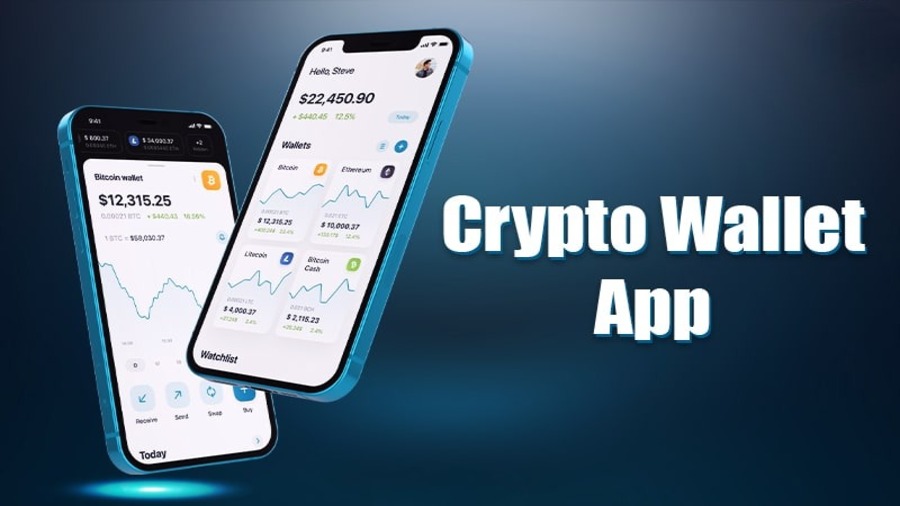Crypto Wallet App: A Beginner’s Guide

Cryptocurrencies are taking the world by storm, and it’s no surprise that crypto wallet apps are becoming increasingly popular. These apps are a secure and convenient way to manage your digital assets, allowing you to send and receive cryptocurrencies, view your balances, and even trade on the go. In this guide, we’ll cover everything you need to know about what a crypto wallet app is, including what they are, how they work, and how to choose the right one for you.
What is a Crypto Wallet App?
A crypto wallet app is a digital wallet that allows you to store, send, and receive cryptocurrencies. It is similar to a traditional wallet, but instead of holding physical currency, it stores your digital assets. Crypto wallet apps come in many forms, including desktop, mobile, and web-based applications.
How Does a Crypto Wallet App Work?
A crypto wallet app works by generating a public and private key pair. The public key is your wallet address, which is used to receive cryptocurrencies, while the private key is used to access and manage your funds. When you send or receive cryptocurrencies, the transaction is verified by the blockchain network, which ensures the integrity of the transaction.
Types of Crypto Wallet Apps
There are several types of crypto wallet apps available, including:
Desktop Wallets
Desktop wallets are applications that are downloaded and installed on your computer. They are often more secure than other types of wallets because they store your private keys on your device. Examples of desktop wallets include Electrum, Exodus, and Atomic Wallet.
Mobile Wallets
Mobile wallets are apps that are downloaded and installed on your smartphone. They are convenient because they allow you to manage your cryptocurrencies on the go. However, they are also more vulnerable to security risks than desktop wallets. Examples of mobile wallets include Coinbase, Trust Wallet, and Mycelium.
Web-based Wallets
Web-based wallets are online applications that allow you to access your cryptocurrencies through a web browser. They are convenient because they can be accessed from anywhere, but they are also more vulnerable to security risks than other types of wallets. Examples of web-based wallets include MetaMask, MyEtherWallet, and Binance Wallet.
Factors to Consider When Choosing a Crypto Wallet App
Choosing the right crypto wallet app can be a daunting task, but here are some factors to consider:
Security
Security is one of the most important factors to consider when choosing a crypto wallet app. Look for wallets that offer two-factor authentication, multi-signature support, and cold storage options.
Supported Cryptocurrencies
Make sure that the wallet you choose supports the cryptocurrencies that you want to store. Some wallets only support a limited number of cryptocurrencies, while others support a wide range.
User Interface
Choose a wallet that has a user-friendly interface that is easy to navigate. This will make it easier for you to manage your cryptocurrencies.
Customer Support
Make sure that the wallet you choose has good customer support in case you run into any issues.
Setting Up a Crypto Wallet App
Setting up a crypto wallet app is relatively straightforward. Here are the general steps:
- Download and install the app on your device
- Create a new wallet
- Write down your recovery phrase and store it in a safe place
- Fund your wallet by sending cryptocurrencies to your wallet address
Best Practices for Using a Crypto Wallet App
While crypto wallet apps are a secure way to manage your digital assets, there are some best practices you should follow to ensure the safety of your funds. Here are a few tips:
Use Strong Passwords
Make sure to use a strong, unique password for your wallet app. Avoid using common words or phrases and never reuse passwords.
Enable Two-Factor Authentication
Two-factor authentication adds an extra layer of security to your wallet by requiring a second form of authentication, such as a code generated by an app on your phone.
Keep Your Private Keys Safe
Your private keys are what give you access to your funds, so it’s essential to keep them safe. Consider storing them in a physical safe or using a hardware wallet.
Only Use Trusted Wallets
Only download and use wallet apps from trusted sources, such as the official app store or the wallet’s official website.
Keep Your Software Up to Date
Make sure to keep your wallet app and operating system up to date to ensure you have the latest security patches.
Risks of Using a Crypto Wallet App
While crypto wallet apps are generally safe to use, there are some risks to be aware of:
Hacking
Hackers can potentially gain access to your wallet if they are able to obtain your private keys or find a vulnerability in the app’s security.
Human Error
Mistakes can happen when managing cryptocurrencies, such as sending funds to the wrong address or losing your private keys.
Scams
There are scams that target crypto users, such as phishing emails or fake wallet apps that steal your funds.
Conclusion
In conclusion, crypto wallet apps are a valuable tool for managing your digital assets securely and conveniently. With a variety of options available, it’s essential to consider factors such as security, supported cryptocurrencies, user interface, and customer support when choosing a wallet that best suits your needs. While using a crypto wallet app can be safe, it’s important to follow best practices, such as using strong passwords, enabling two-factor authentication, and keeping your private keys safe. Additionally, be aware of the potential risks, including hacking, human error, and scams. By taking the necessary precautions and being vigilant, you can use a crypto wallet app with confidence and manage your digital assets with ease.

I’m known as one of the best crypto authors because I take time to understand the technology and write in a way that is easy for others to understand. I can simplify complex concepts and my writing style is engaging. My articles have been featured on some of the top crypto sites and I’mregularly sought out by readers for my insights on the latest news. I’m also a speaker and have discussed crypto at various conferences. If you’re looking for someone who can help you make sense of the ever-changing world of cryptocurrency, then you can get in touch with me.



